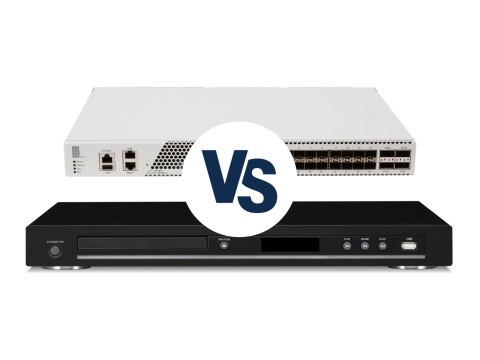DVR vs. Video Server: Which One’s Your Ride-or-Die?
Features
Choices
For Homes & Small Businesses
Alright, let’s settle this: DVR or video server? The debate’s been raging for years among security pros. Both have their die-hard fans, and trust me, the arguments can get heated.
So, what’s the deal? Let’s break it down:
- Video servers come loaded with advanced features like object recognition and seamless integration with other apps.
- DVRs? Way cheaper-perfect if you’re on a budget.
- Video servers can be loud and might need extra cooling gear.
- DVRs, while solid, often choke on more advanced tasks.
Here’s the lowdown:
What’s a Video Server Anyway?
Think of it as a two-part system:
- Hardware - the guts of the operation (called the platform).
- Software - built to handle specific tasks and runs the show.
Video servers shine in situations like:
- Breaking down video streams for analysis.
- Syncing with access control systems.
- Playing nice with third-party apps.
- Integrating with POS systems.
- Optimizing data backups.
- Powering smart searches in video archives.
- Solving unique or tricky problems.
Let’s zoom in on those features.
What Makes Video Servers Stand Out?
Smart Video Analysis
Need to ID shady characters in the subway? Catch speeding cars with license plate detection? Confirm someone’s identity at a high-security checkpoint? A DVR might struggle-or flat-out fail.
Integration with Security Systems
Hooking a DVR into a complex security setup is like forcing a square peg into a round hole. It’s hit or miss. On the flip side, a video server can:
- Pivot a camera toward an activated sensor.
- Trigger recording when an alarm goes off.
- Automatically display footage from a specific zone on the main screen.
Teaming Up with Third-Party Apps
Here’s where video servers get slick. Imagine a retail setup where your system tracks inventory, logs employee hours, and monitors efficiency-all while keeping an eye on security. A DVR just doesn’t have the range.
POS Systems & Surveillance
Pairing video servers with POS systems is a game-changer, especially in retail:
- Spot and review incidents at checkout.
- Monitor cashier performance and honesty.
- Catch fraud-whether it’s the customer or the cashier pulling tricks.
Archiving Like a Pro
DVRs are dependable, sure, but video servers bring heavy-duty perks:
- RAID arrays for rock-solid data storage.
- Hot-swappable drives and alert systems for quick fixes.
- Smart software that shifts video streams around during issues, restoring them once things are fixed.
Advanced Search Tools
Need to find footage of a specific face, license plate, or event? Video servers crush this with custom indexing and filters, making your search lightning fast.
Handling Weird Tasks
Got a one-off problem? Video servers can run custom scripts to:
- Send alerts for unusual activity.
- Snap and save screenshots.
- Monitor parking lot availability.
- Push video backups to the cloud.
When to Roll with a DVR
DVRs are the MVP for smaller setups, like:
- Homes, garages, or small shops.
- Simple “record and review” needs.
- No in-house IT team.
- No plans to scale up.
Bottom line: DVRs are great if you’re keeping it simple. If you’re thinking big-like managing a sprawling network or crunching tons of data-a video server might be the smarter bet.
The Verdict
Picking between a DVR and a video server isn’t a one-size-fits-all deal. It all depends on your needs, budget, and future plans. For small setups, stick with a DVR. But for heavy-duty tasks and growth potential, a video server’s your go-to.

